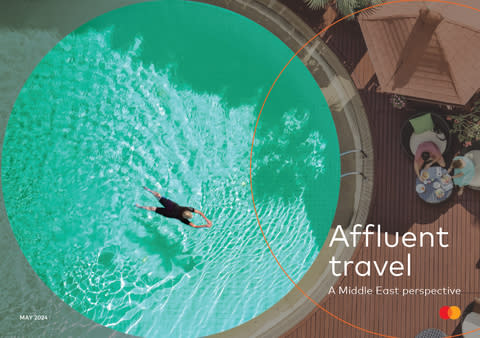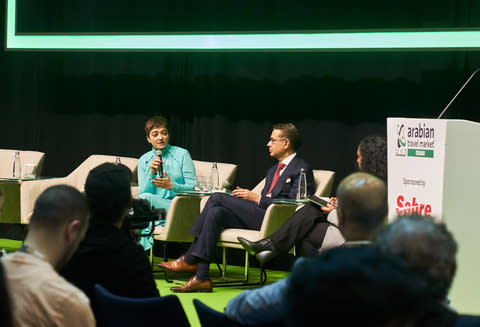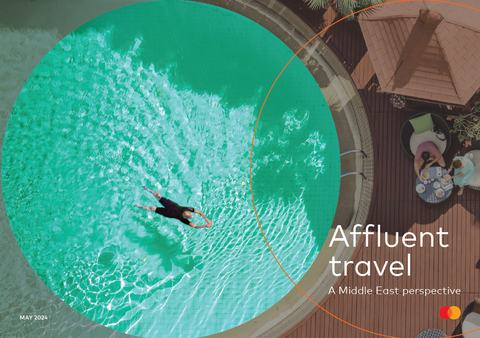




-
Report highlights the role of wealthy travelers in revitalizing the travel and hospitality industry
-
More than a third (38%) of luxury seekers are willing to pay 30-50% more for sustainable travel features1
-
Wealthy travelers in the MENA region are power users of loyalty and membership card programs
-
GCC tourists are some of the highest spenders, whether on holidays within the region or further afield.
Dubai, United Arab Emirates, May 7, 2024–(BUSINESS WIRE)–The Middle East and North Africa (MENA) region has emerged as one of the key regions driving the growth of high-net-worth travel, recording high spending while also offering sustainable eco-luxury and meaningful travel. It also shows a desire for cultural experiences. In Mastercard's latest report, “Enriching Travel: A Middle Eastern Perspective”, Released during the 2024 Arabian Travel Market, some of the key trends have been revealed.
According to Grand View Research, the desire for new experiences, micro-trips and 'leisure' in unexplored destinations is likely to drive the growth of the global luxury travel market by 7.9% between 2024 and 2030. is expected to grow at (CAGR).2. While the world waits for its first billionaire to emerge, high-net-worth travelers account for about 36% of global travel spending, according to research from Jones Lang LaSalle.3.
“At Mastercard, we are committed to connecting people with their passion for travel. This report provides a great snapshot of how high-net-worth individuals choose to travel, and provides a sustainable and sustainable way to travel. It's great that sex, cultural immersion, and purpose are key considerations. With quality accommodations, seamless technology, and loyalty benefits, we're powered by partnerships with industry-leading companies. We continue to create innovative solutions that leverage the power of our customers and give them access to a whole new world of unparalleled travel experiences.” Amnah Ajmal, Executive Vice President, Market Development EEMEA, Mastercard.
More than a third (36%) of luxury travelers say they want to experience another culture, according to YouGov research.Four. As digital nomads change the face of travel by combining business and leisure, or “bleisure,'' remote work travel is also on the rise.Wealthy travelers are almost twice as likely as the global average to have taken a vacation as an extension of a business tripFour. Furthermore, a Marriott Bonvoy survey shows that solo travel is accepted, with 70% of respondents in the United Arab Emirates and 69% in Saudi Arabia having traveled solo. is the answer.Five.
Pursuing sustainable certification and authentic eco-luxury
Wealthy consumers are enthusiastically embracing conscious travel trends and value authenticity in their eco-luxury experiences. These include partnering with travel brands that support local communities. Globally, 1 in 10 consumers have stayed in eco-friendly luxury accommodation in the past three years, compared to 1 in 10 high-net-worth individuals aged 18-34. There are 5 people in the middle. According to Euromonitor, a significant 38% of people who seek luxury goods are willing to pay between 30% and 50% more for sustainable travel features such as energy-efficient services. I think it's okay.It costs a quarter more to find transport with a lower carbon footprint1.
Experiences that are more meaningful than material things
The YouGov report notes that this discerning demographic values experiences over physical products. More than half of wealthy travelers (compared to his 43% worldwide) prioritize meaningful travel experiences over shopping and souvenirs.Four. Nearly a quarter say they are willing to pay more for remote experiences, customized tours that connect with local culture, and eco-friendly resortsFour.
Personalization, privacy and luxury
Luxury travelers prioritize unique, personalized experiences over location. But they also want value for money in the form of exemplary customer service and luxury. Quality luxury accommodation is a top priority, with 27% saying they would be willing to pay more for a villa or chalet in a secluded and private location, and 21% for a luxurious stay on a private island respondents said they were satisfied with their luxurious stay.Four. Younger, more affluent travelers tend to pay more for Michelin-starred experiences and unique gastronomic experiences. Guided through a digital concierge, the light, air, temperature, and sound of future hospitality spaces will recognize and respond to guests in real time based on their mood, schedule, and health requirements, according to Marriott Bonvoy research. .
Loyalty supporters with high spending
Based on average spending per card by origin market, GCC travelers are among the highest spenders. Kuwaiti tourists, for example, spend an average of $3,390 per card in Paris, five times more than American tourists, according to a 2023 Mastercard Economic Institute report. High net worth individuals are also power users of loyalty schemes and membership cards. 34% compared to the overall average of 24%.6. Euromonitor's report highlights that exclusive airport lounges, priority check-in and priority boarding are among the most popular loyalty membership benefits.1.
As wealth shifts to younger generations, Millennials (ages 30-44) now make up the highest proportion of those seeking luxury goods, followed by Gen Z (ages 15-29). 1. However, within the GCC, Generation X (ages 43 to 58) is expected to contribute the most to travel growth, according to Arabian Travel Market.7. While many regions of the world are still catching up to pre-pandemic travel levels, MENA is the only region where airport arrivals are 22% higher than in 2019. According to the World Tourism Barometer, certain destinations such as Qatar (+90%) and Saudi Arabia (+56%) are contributing to this surge.8.
Click here to learn more about the report.
Note to editor
Mastercard's “Enriching Travel: A Middle Eastern Perspective” report was written by White Paper Media Consulting. Sources and data include Mastercard Economy Institute, Marriott Bonvoy, YouGov, Adara and Euromonitor.
References
-
Bremner, Caroline. Roberts, Flew. Meet a new breed of discerning, digitally savvy and diverse luxury travel seekers. Euromonitor. February 14, 2024.
-
Grand View Research. Luxury travel market size, share, and trend analysis report.
-
Demuth, Zack et al. The evolution of global luxury hospitality. Jones Lang LaSalle (JLL). May 15, 2023.
-
Stewart, Eva. A prosperous future of travel will be one that balances luxury, happiness, and exclusivity. Your Government August 14, 2023.
-
Marriott Bonvoy. Marriott Bonvoy's 2024 Future Travel Trends. January 2024.
-
Mastercard Economic Research Institute. Tourism promotes economic diversification in Gulf countries.
-
Press statement. According to ATM, research shows that Generation X is driving international travel to the GCC. Arabian Travel Market. February 6, 2024.
-
UNWTO World Tourism Barometer. International tourism is expected to reach pre-pandemic levels in 2024. January 19, 2024.
*Source: AETOSWire
View source version on businesswire.com. https://www.businesswire.com/news/home/20240507531225/ja/
contact address
mastercard communications
Amelia Naidoo – Amelia.Naidoo@mastercard.com


